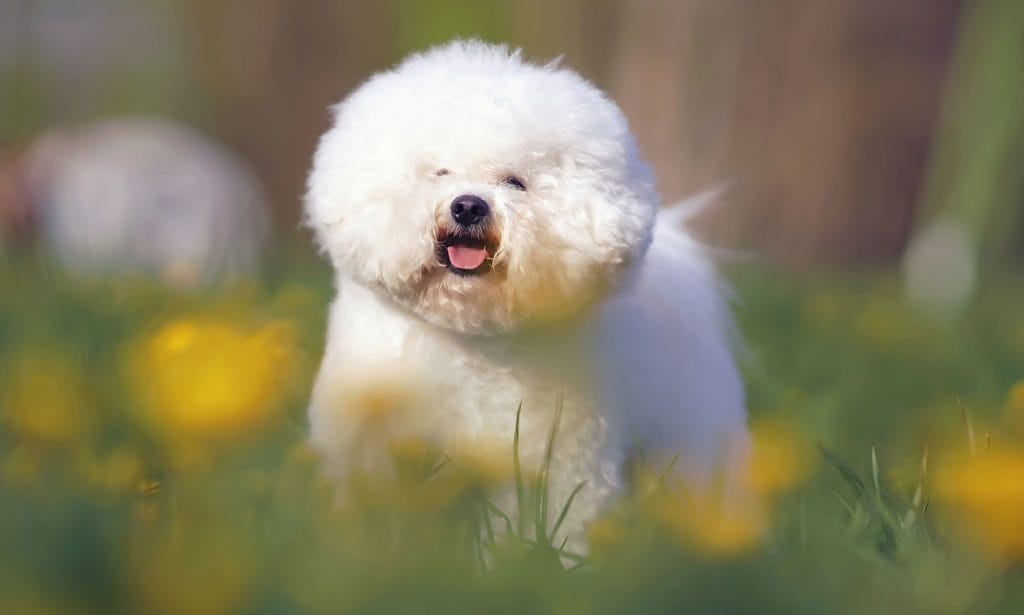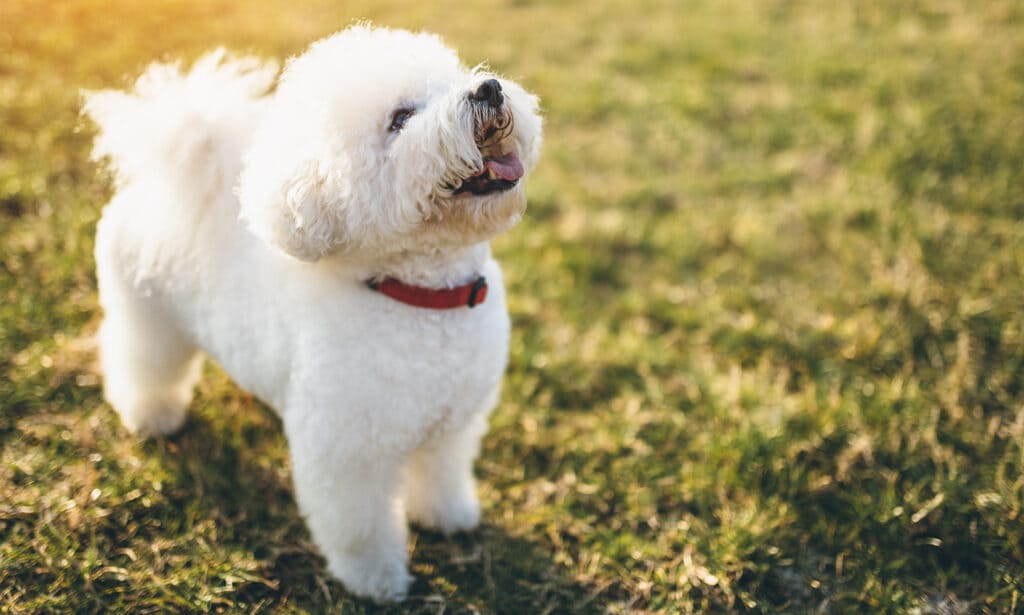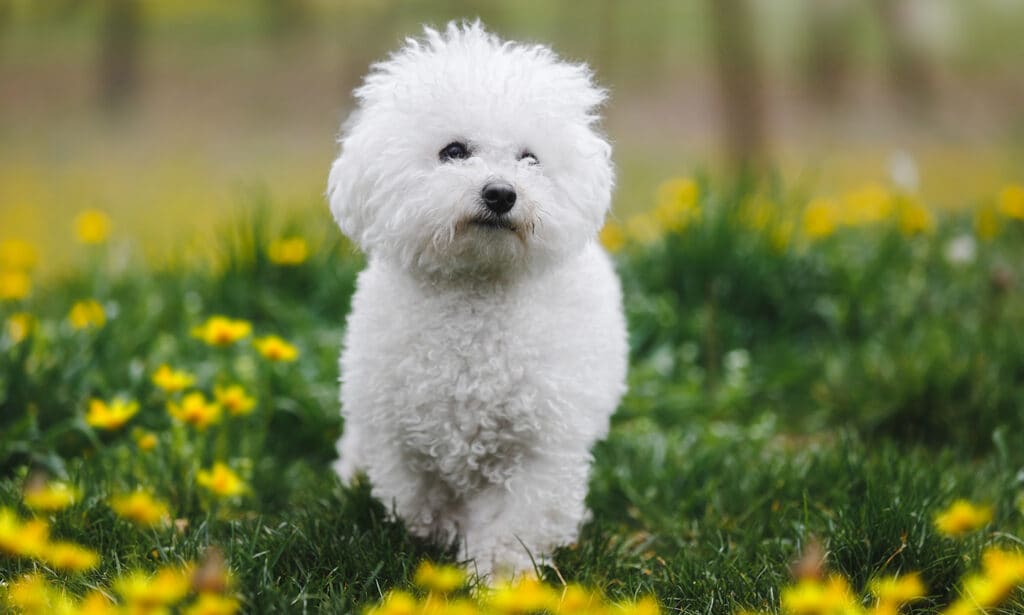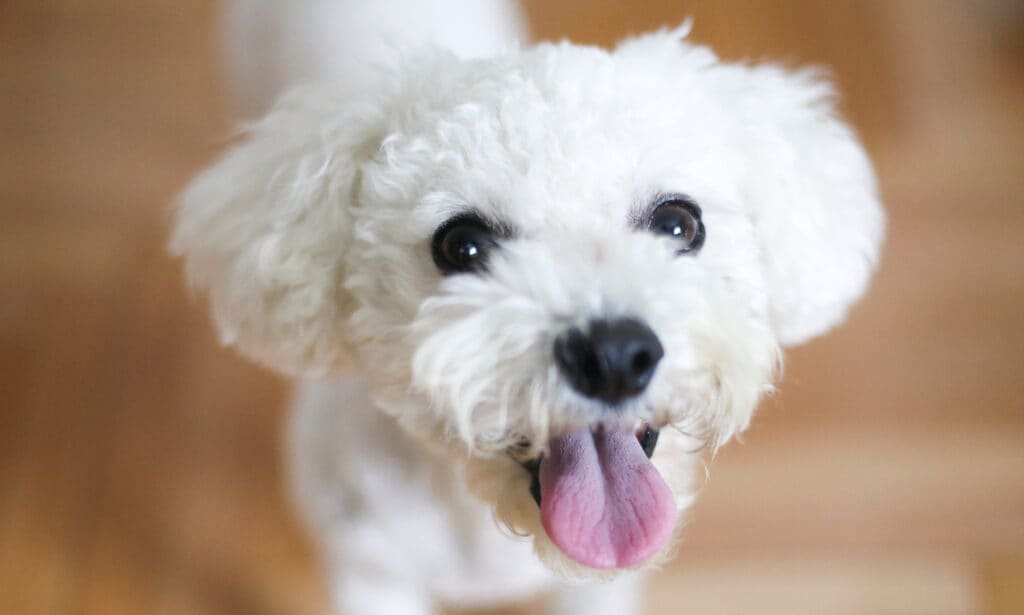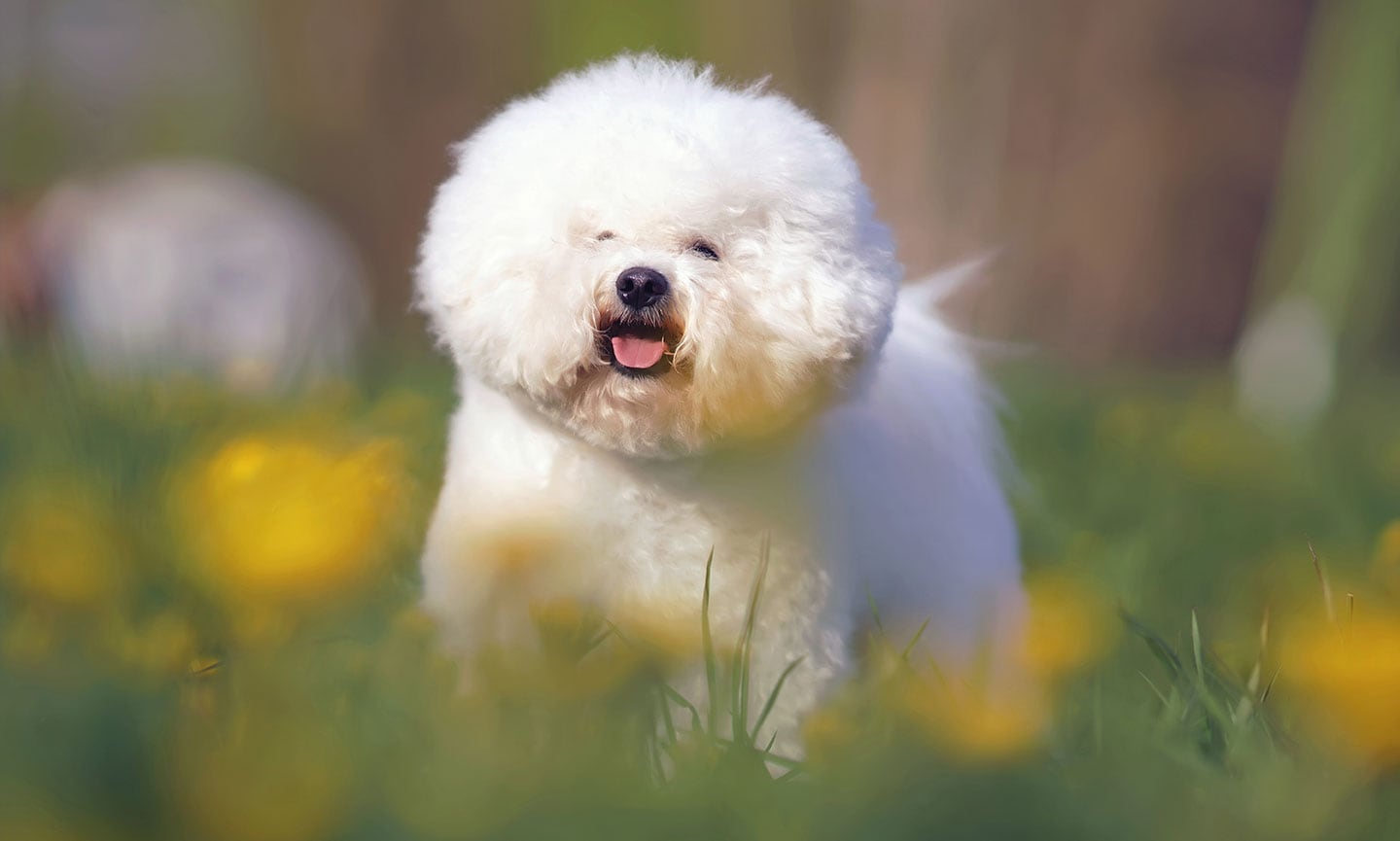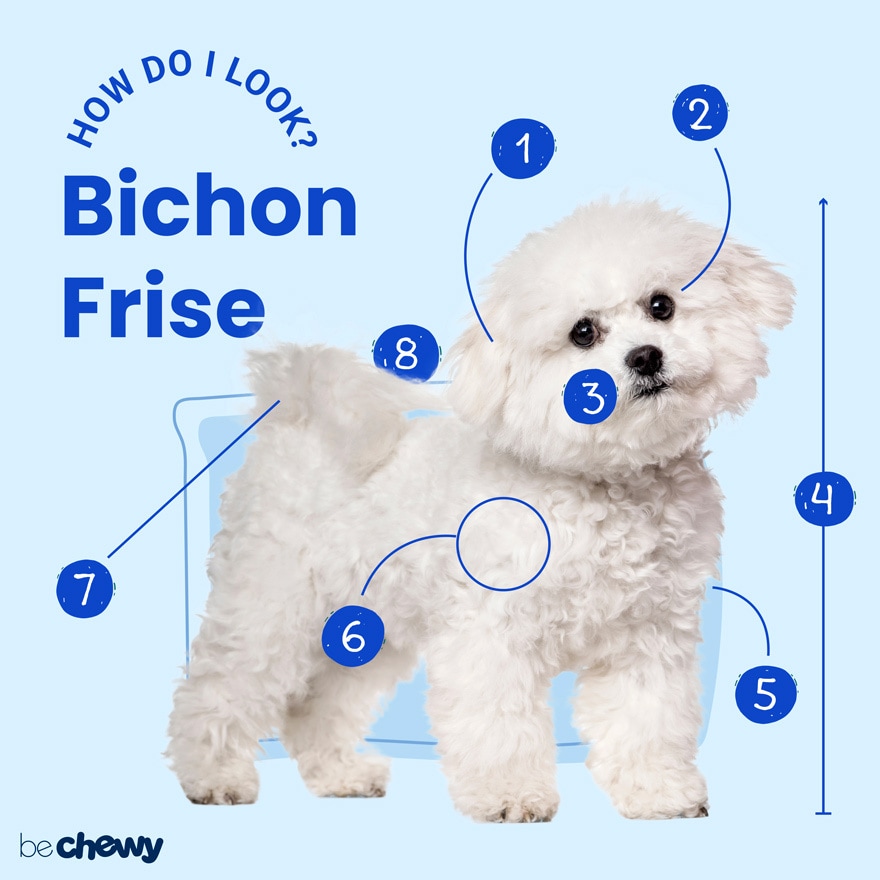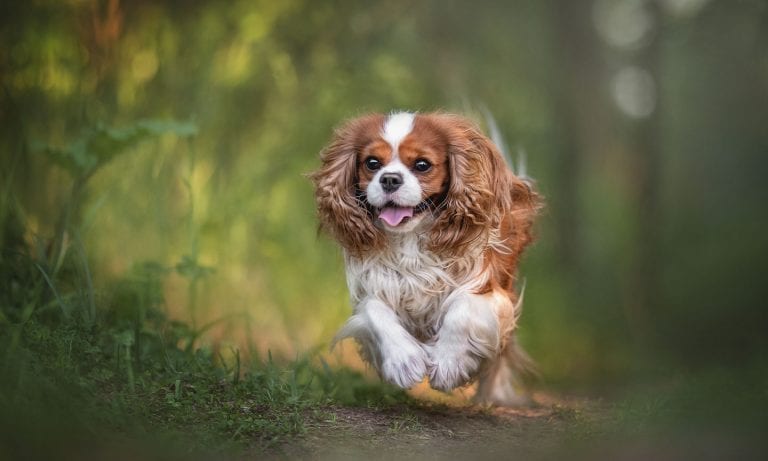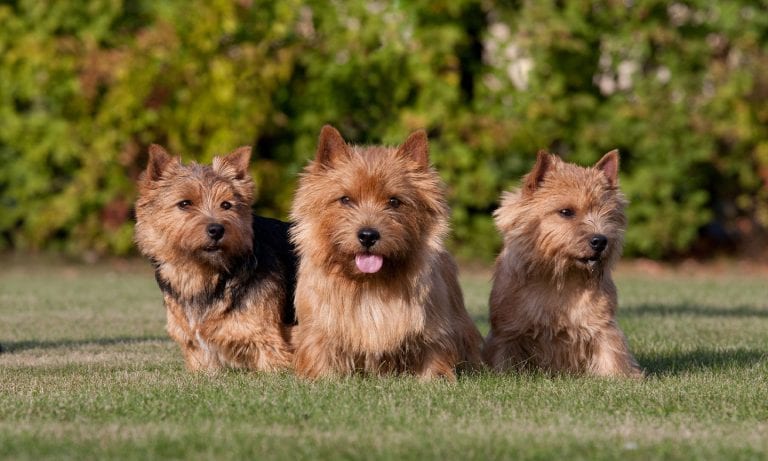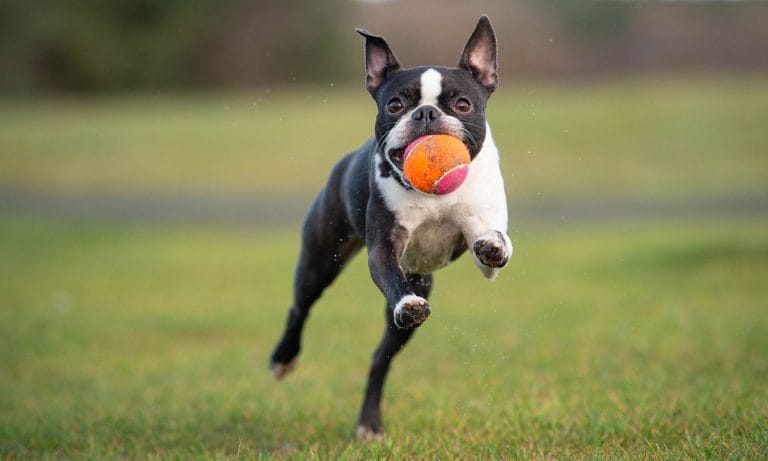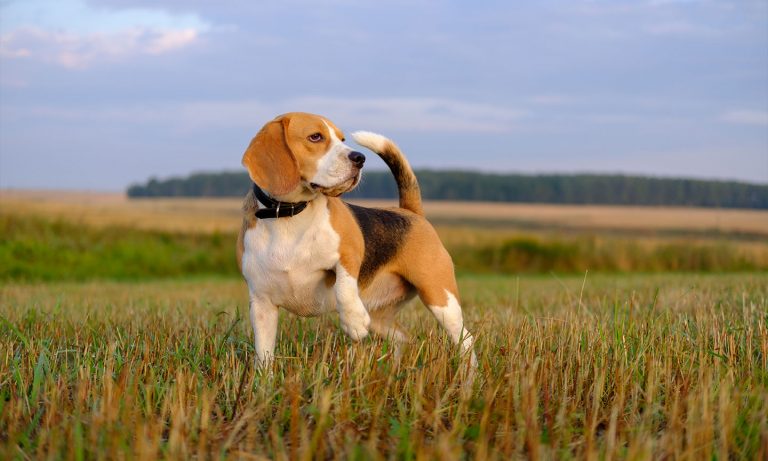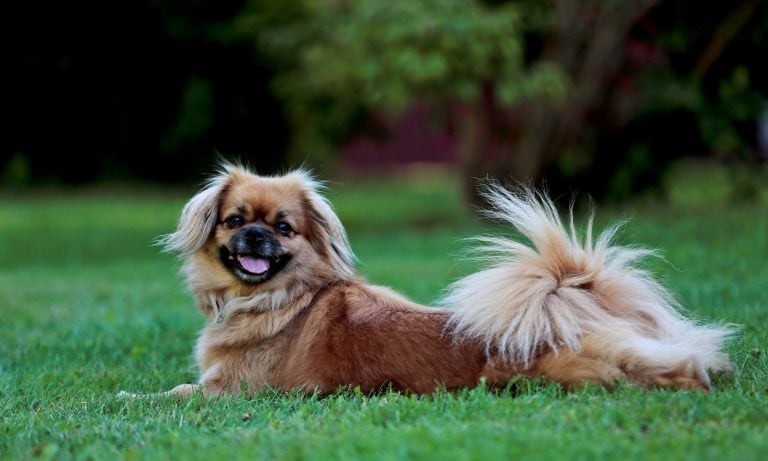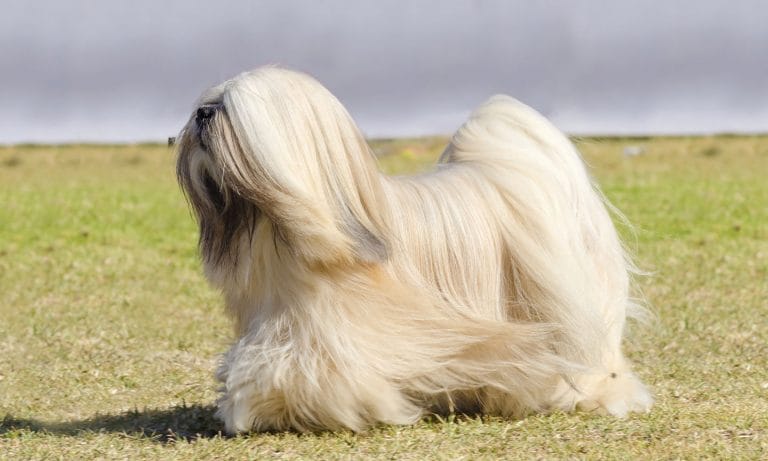A Bichon Frise is your No. 1 fan. Seriously. They think everything you do is the most interesting thing in the world—even if it’s just pouring cereal. (Nobody does it better!) Bichons stick by you through thick and thin. They’re there for you through a break up, and they’re there for you when you’d rather have a little privacy. Even though they may be a little Velcro-y at times, their trademark charm will win you over. Plus, they’re as smart as a whip. (They were once circus performers!) A Bichon Frise will have you putting away that mix tape in no time because, really, you’d rather spend your time laughing with your pup anyway.
Breed Snapshot
Temperament:
Velcro DogFun-lovingSmartCoat Color:
White
Best For
Affectionate and adaptable, Bichon Frises are best for pet parents who have more low-key lifestyles and are looking for a friendly and sociable companion. This charming dog breed does well as apartment-dwellers or in homes on the range.
Bichon Frise Temperament
If the movie biz was composed entirely of canines, the Bichon Frise would win a People’s Choice Award. Their charming personality effortlessly captures everyone’s attention, including other pups. The Bichon is a lover, not a fighter and wants to engage with other people and pets. Smart with plenty of emotional intelligence, a Bichon can be adept to navigating the needs of people around them—especially if trained and socialized at an early age.
The Bichon Frise dog breed is great with kids and babies and can happily spend the morning romping with toddlers in the backyard. Later in the day, they’re content to spend hours curled on the lap of your great grandma. In fact, it’s this calming characteristic that makes them great emotional support and therapy dogs.
Velcro dog alert: Bichons do not like to be left alone for long (their name does mean “curly lapdog,” after all), but that doesn’t mean you need to entertain them 24/7. (It does mean you can say goodbye to peaceful soaks in the bathtub.) They need to have people around during the day.
How to Care for a Bichon Frise
Small and hearty with a long lifespan, Bichons are a delightful addition to your family. Yes, that powder-puff coat requires a lot of maintenance, but their grooming time is perfectly balanced by their low exercise and average training needs.
Bichon Frise Health
Bichons are a hearty breed with a relatively long lifespan of 14-15 years, but like any breed, they are prone to certain illnesses. It’s important to know what these health issues are in advance, so you can help your pup live a full and active life.
- Luxating patella: Bichon Frises can be prone to a condition called luxating patella, in which the knee cap moves out of place. Over time, this can damage cartilage and result in pain and a reduction of movement. Environmental factors, such as obesity, can worsen this sometimes-genetic condition. Treatment may include medication or surgery, depending on the severity.
- Eye Problems: Bichon Frises are prone to cataracts, leading to blindness as your dog gets older. While surgery is an option if your dog develops cataracts, many dogs can adjust to blindness, especially in one eye. Frequent vet visits can help monitor any slow-developing vision problems. Bichons are also susceptible to distichiasis, a condition where an eyelash grows inward toward the eye, causing irritation and pain. Treatments can vary from lubricating gels or ointments to surgery, depending on the severity. Corneal dystrophy, a condition that causes cloudiness in the outer layer of the eye, can also be seen in Bichons as early as 2 years of age. This condition is thought to be inherited and does not always require treatment.
- Bladder Stones: Bladder stones are the fourth most-common disease for Bichons. They develop due to excess minerals in the urine. Just like with humans, bladder stones can be painful. Depending on the type and severity, treatment options range from a special diet to surgery. If you see your dog urinating more often, straining while urinating or licking their genitals more frequently, talk to your vet.
- Liver Problems: Bichons are prone to a liver disorder called portosystemic shunt (PSS). In PSS, the blood supply is diverted from the liver, resulting in toxin buildup over time. Medication, monitoring and surgery are all ways to deal with this condition.
- Diabetes Mellitus: Bichon Frises are more prone to developing diabetes mellitus than some other dog breeds. This condition occurs when the pancreas fails to produce adequate insulin and results in elevated blood sugar levels. Because diabetes has the potential to be life-threatening, it is vital to monitor for this disease on a regular basis, and pay close attention to any changes in thirst, appetite or weight as your Bichon ages.
Use your grooming time each week to assess your Bichon’s overall health. Take note of anything unusual or any unusual behaviors. Conditions diagnosed and treated early may have better outcomes and may have less invasive treatment options, including monitoring, medication and diet modification.
Bichon Frise History
The Bichons have a history full of folklore that would make for a fascinating drama—their origins are shrouded in mystery. (Are they Egyptian? Maybe Greco-Roman.) Regardless, it’s widely believed a popular, small white dog is the ancestor to the modern Bichon. (Side note: These dogs were so desirable, they were often used for bartering—apparently even Cleopatra adored the “little white dog”!)
What we do know is that the Bichon began their journey to becoming the dog we love today on the Canary Islands (Tenerife, to be precise). There, the four “cousins” (Havanese, Maltese, Bolognese and Bichon) were developed and called barbichons. The Bichon, so closely tied to the island, was known as the Tenerife Bichon.
Around the 13th century, Bichon Frises were brought to the European mainland and were the delight of royal courts across the continent; you often see them in paintings from the Renaissance era. It’s been said that King Henry III of France was so taken with the breed, he carried a few with him everywhere in a shallow basket suspended by neck ribbons! (Truly, the Bichon was the “it” accessory of the day.)
In the 18th century, as revolutions swept the world, the Bichon breed became collateral damage. Instead of living in palaces, they were living on the street. But don’t fret! This is not where our story ends. Street performers found that the Bichon’s winning personality and quick-study intellect made them ideal performing partners. Soon, these plucky pups graced European circuses with their delightful presence.
In the early 20th century, Bichons again became collateral damage to global forces. Both world wars shook Europe, reducing the demand for circus dogs. The breed faced extinction, but Bichon lovers found surviving dogs and led the charge for modern breed recognition. In 1933, France’s Societe Centrale Canine coined the Bichon breed “Bichon a Poil Frise,” meaning “Bichon of the curly hair.”
In 1956, Bichons made their way to California, and the Bichon Frise Club of America was founded in 1964. The American Kennel Club added them to the Miscellaneous class in 1971 (dogs on their way to AKC status), and they received their full breed recognition in 1973.
Want to add a Bichon Frise as a pet? You can find a list of reputable breeders on the AKC website. A Bichon Frise puppy can cost between $600-$1,000. But for that, you usually get a dog screened for health and temperament issues, and they might even come with pedigree papers. You can also look for the breed at local Bichon Frise rescues or animal shelters (a great way to give a fully grown Bichon some much-needed love!). You can also search Chewy’s database of adoptable dogs in your area. Don’t forget to include regular grooming as part of your “Bichon budget” as well as other expenses such as vet visits, food and treats.
Sometimes unscrupulous breeders will use terms to charge you more money for a puppy. The AKC does not recognize “teacup Bichon Frises.” These tiny dogs were often bred for the recessive dwarf gene. While they may look cute, these dogs may actually have more health issues down the road than a normal Bichon would. Also, if anyone tries to sell you a “rare” black Bichon—run. It’s possible the pup is a Poochon (Bichon-Poodle mix), but a purebred Bichon is always white.
FAQs
Are Bichon Frises hypoallergenic?
While no dog is 100 percent hypoallergenic, Bichon Frises are considered hypoallergenic because they don’t shed much and don’t produce a lot of dander. These dogs are a great choice for people with allergies.
How long do Bichon Frises live?
Bichon Frises have a life expectancy of 14-15 years—a long time for you to create many wonderful memories with your pup.
Do Bichon Frises bark?
Bichon Frises do bark but not as often as other dogs (like the Chihuahua). Bichons may bark because they’re happy to see you or want your attention. If you’ve been gone a while, they may be giving you the business for leaving them alone! While you can’t train them to stop barking completely, you can teach them to have good manners. Also, spending time with your pup and redirecting those barking tendencies toward something else (like a favorite toy) may help. If excessive barking is a problem, consult a certified dog trainer.
Are Bichon Frises smart?
Yes! Bichon Frises are incredibly smart and take well to learning new tricks. However, their greatest gift may be their emotional intelligence: They’re experts at “reading the room” and knowing exactly who needs some snuggles the most.
How do you pronounce Bichon Frise?
“Bichon Frise” can be confusing to pronounce, especially if you’re not French. The name comes from a French phrase meaning “curly-haired dog.” Bichon Frise is pronounced bee-shahn free-zay.
What are the most common Bichon Frise mixes?
- Bichon-Golden Retriever mix (Goldichon)
- Bichon-Poodle mix (Poochon)
- Bichon Frise-Maltese mix (Maltichon)
- Bichon Frise-Shih Tzu mix (Schichon)
- Bichon Frise-Yorkie mix (Yorkie Bichon)
- Bichon Frise-Chihuahua mix (ChiChon)
Note: These are not purebred dogs but mixed breeds.

Top Takeaways
“Lonely” is not an option with a Bichon Frise. A Bichon Frise will always be up in your space (and under your covers) and will keep you and your family laughing with their antics. Because they require plenty of human attention, it’s important to prioritize your Bichon’s emotional needs the same way they prioritize yours. Having plenty of time to hang out at home (or bringing your Bichon along with you on errands) will lead to plenty of memories together.
Expert input provided by Dr. Sara Ochoa, DVM and veterinary consultant for DogLab.com; and Sparky Serka, IACP, head trainer, The Puppy Academy in Hermosa Beach, California.
Breed characteristic ratings provided by veterinarian Dr. Sarah J. Wooten, DVM, CVJ, a veterinarian at Sheep Draw Veterinary Hospital in Greeley, Colorado; dog trainer and behavior consultant Irith Bloom, CPDT-KSA, CBCC-KA, CDBC, owner of The Sophisticated Dog, LLC, in Los Angeles; and certified animal behavior consultant Amy Shojai, CABC, in Sherman, Texas.
The health content was medically reviewed by Chewy vets.

Search for Adoptable Bichon Frises Near You
Female Names
- Bella
- Daisy
- Luna
- Lola
- Molly
- Lucy
- Lily
- Chloe
- Sophie
- Bailey
Male Names
- Teddy
- Milo
- Buddy
- Charlie
- Oliver
- Toby
- Max
- Cooper
- Ollie
- Louie
Share:
